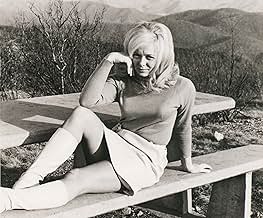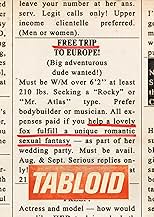IMDb RATING
7.0/10
7.5K
YOUR RATING
A documentary on a former Miss Wyoming who is charged with abducting and imprisoning a young Mormon Missionary.A documentary on a former Miss Wyoming who is charged with abducting and imprisoning a young Mormon Missionary.A documentary on a former Miss Wyoming who is charged with abducting and imprisoning a young Mormon Missionary.
- Awards
- 4 wins & 9 nominations total
Featured reviews
A documentary on a former Miss Wyoming (Joyce Bernann McKinney) who is charged with abducting and imprisoning a young Mormon Missionary (Kirk Anderson).
The film becomes the story: In November of 2011, Joyce McKinney filed a lawsuit against director Errol Morris. Filed with the Los Angeles Superior Court, McKinney claims that Morris and his producer Mark Lipson told her they were filming for a TV documentary series about the paparazzi. McKinney is suing on the grounds that she was defamed as the film portrays her as "crazy, a sex offender, an S&M prostitute, and/or a rapist."
McKinney probably only helped the film with her lawsuit, if she had any effect at all. I do not feel they in any way defamed her, as they were merely reporting on the story and gave her ample time to give her version of events. A viewer is not left with any definite vision of who McKinney is or was.
Further, I am confused how she thought this was solely about the paparazzi. I understand that she talks of being hounded, but she also talks at length about the Mormon case, her cloned dog and any other thing. Even if this went on a TV program about paparazzi, they would have to explain to audiences who she was. So by cooperating -- regardless of the focus -- she was the one bringing herself back into the public light.
The film becomes the story: In November of 2011, Joyce McKinney filed a lawsuit against director Errol Morris. Filed with the Los Angeles Superior Court, McKinney claims that Morris and his producer Mark Lipson told her they were filming for a TV documentary series about the paparazzi. McKinney is suing on the grounds that she was defamed as the film portrays her as "crazy, a sex offender, an S&M prostitute, and/or a rapist."
McKinney probably only helped the film with her lawsuit, if she had any effect at all. I do not feel they in any way defamed her, as they were merely reporting on the story and gave her ample time to give her version of events. A viewer is not left with any definite vision of who McKinney is or was.
Further, I am confused how she thought this was solely about the paparazzi. I understand that she talks of being hounded, but she also talks at length about the Mormon case, her cloned dog and any other thing. Even if this went on a TV program about paparazzi, they would have to explain to audiences who she was. So by cooperating -- regardless of the focus -- she was the one bringing herself back into the public light.
Even if you know all the lurid details about the Joyce McKinney sex in chains saga, it is still well worth it to listen to the protagonist tell her side of the story. It would have taken a lot of courage/narcissism for anyone to agree to be interviewed for a documentary after going through what Ms. McKinney went through, but what is even more astounding is just how self assured and confident she was throughout the interview.
Ms. McKinney acquitted herself well and leaves the viewer with a sense of her human frailties as she tells the story of her remarkable life. There are those who would condemn her or write her off as sick and demented -- and even in this documentary it is possible to see where these people are coming from -- but the film also presents another side of the woman, one who loved absolutely so much so that she thought nothing of cloning a dog she cared about.
There will probably never be another Joyce McKinney. If you wrote a movie script that was true to her life, it would probably be rejected as too far fetched and absurd. Watch this documentary and judge for yourself what sort of person Joyce McKinney is. I think that is all she would ask of you.
Ms. McKinney acquitted herself well and leaves the viewer with a sense of her human frailties as she tells the story of her remarkable life. There are those who would condemn her or write her off as sick and demented -- and even in this documentary it is possible to see where these people are coming from -- but the film also presents another side of the woman, one who loved absolutely so much so that she thought nothing of cloning a dog she cared about.
There will probably never be another Joyce McKinney. If you wrote a movie script that was true to her life, it would probably be rejected as too far fetched and absurd. Watch this documentary and judge for yourself what sort of person Joyce McKinney is. I think that is all she would ask of you.
Some people are serial fantastists, or serial self-publicists: it can be hard to tell the difference. Errol Morris' entertaining film 'Tabloid: Sex in Change' will seem familiar to anyone whose seen the (altogether more serious) film 'True Lies': in both cases, someone collaborates with a contemporary film-maker to tell "their story", even though the film-maker is able to simultaneously compile a large body of evidence to suggest that this story is utter tosh. The protagonists of both films could be considered con-artists, but if so, neither of them are exactly very good: in taking part in these films, they manage not to control the narrative, but to destroy themselves (although, if self-publicity is the aim, they do succeed, albeit in a peculiar fashion). Joyce McKinney's story (both the real one, and the one that she tells) is straightforwardly bizarre; while the linked tale of the behaviour of tabloid newspapers is predictably depressing, although one can't help but wonder whether or not Morris would have done better to let sleeping dogs lie (something McKinney didn't do when she had her dead pet cloned) rather than give the whole affair another publicising blast of the oxygen. It's hard to draw many conclusions from such a weird tale about the state of our society, or even about the interior workings of McKinney's mind; yet it's also impossible not to be entertained, albeit in a prurient way, by the extraordinary details of her tale.
By the last quarter of this turgid, unremitting virtual-monologue, I was in fear of losing my own marbles -- Joyce having clearly lost hers long ago. Pointing a camera at someone and letting them damn themselves with their own deluded waffle is not my idea of effective film making. Completely lacking in visual impact, this "film" might as well have been done on radio.
The supporting cast of tabloid creeps interviewed herein are enough to make one's skin crawl. Exploiting a crazy lady is neither funny nor clever so quite why the guy from The Daily Mirror appeared to be so proud of his machinations is beyond me.
I'd hoped for some deeper insight. I didn't get any. Only denial and madness. On this showing the woman needed to be sectioned. Too late now though. Far too late.
The supporting cast of tabloid creeps interviewed herein are enough to make one's skin crawl. Exploiting a crazy lady is neither funny nor clever so quite why the guy from The Daily Mirror appeared to be so proud of his machinations is beyond me.
I'd hoped for some deeper insight. I didn't get any. Only denial and madness. On this showing the woman needed to be sectioned. Too late now though. Far too late.
Errol Morris hits a home run with "Tabloid," letting the main subject, Joyce McKinney, pontificate for long stretches at a time; and Ms. McKinney never disappoints. This is a sad and compelling news story from 1977, well known in Britain as "The Manacled Mormon" case. An American Mormon missionary claimed to be abducted and raped by Ms. McKinney and what follows is a tragic but often funny documentary that is truly stranger than fiction. I can't find better adjectives(used by someone interviewed) than barking mad to describe this delusional, obsessed, and sorry figure.
The missing element is Kirk Anderson, the alleged victim and abductee, as he refused to be interviewed. Director Morris has a field day with Mormon beliefs, from magic underwear to planets ruled by deceased true believers. The Salt Lake City elders will not be pleased with this film. I highly recommend it to everyone else.
The missing element is Kirk Anderson, the alleged victim and abductee, as he refused to be interviewed. Director Morris has a field day with Mormon beliefs, from magic underwear to planets ruled by deceased true believers. The Salt Lake City elders will not be pleased with this film. I highly recommend it to everyone else.
Did you know
- TriviaFilmmaker Errol Morris was sued by Joyce McKinney, the central figure of the documentary for allegedly tricking her into appearing in the film.
- How long is Tabloid?Powered by Alexa
Details
- Release date
- Country of origin
- Languages
- Also known as
- Storyville: Tabloid: Sex in Chains
- Production companies
- See more company credits at IMDbPro
Box office
- Gross US & Canada
- $696,921
- Opening weekend US & Canada
- $91,201
- Jul 17, 2011
- Gross worldwide
- $731,925
- Runtime
- 1h 27m(87 min)
- Color
- Sound mix
- Aspect ratio
- 1.78 : 1
Contribute to this page
Suggest an edit or add missing content






















